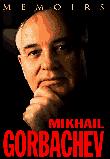Time is fleeting. Yes, it is. One datum is that John Lennon’s anthem “Imagine” is now 50 years old. Another is something that was once scarcely imaginable at all: Thirty years ago, having lost its Eastern European satellite states, the Soviet Union collapsed, giving birth to a dozen new countries overnight.
 Overseeing the fall was the last Soviet leader, Mikhail Gorbachev, who had politicked himself out of a job over the preceding six years. He took office on March 11, 1985, after old-school Communist boss Konstantin Chernenko died, the third Soviet supreme leader to die in just that half-decade. It was not only those men who died, Gorbachev recounts in his Memoirs. “The very system was dying away,” he writes. “Its sluggish senile blood no longer contained any vital juices.”
Overseeing the fall was the last Soviet leader, Mikhail Gorbachev, who had politicked himself out of a job over the preceding six years. He took office on March 11, 1985, after old-school Communist boss Konstantin Chernenko died, the third Soviet supreme leader to die in just that half-decade. It was not only those men who died, Gorbachev recounts in his Memoirs. “The very system was dying away,” he writes. “Its sluggish senile blood no longer contained any vital juices.”
A comparative youngster at 54, Gorbachev was not a universally popular choice for the job. He had been a loyal Communist since his teenage years but was effectively stranded as a middle manager in the vast Soviet bureaucracy, kept from foreign travel—a sure sign, he writes, of one’s political status—with the assurance that he was simply too important to leave the country. He got away now and then, however, and he noticed that the people of other countries seemed happier than did his compatriots.
Given his chance to lead as a compromise candidate, and sure that the Communist Party could be shaped into an agent of reform so that “we would be able to unfold the creative forces of socialism on a larger scale,” Gorbachev loosened the reins. He introduced economic reforms and eliminated some of the harsher practices of centralized planning, replacing them with policies that were collectively called perestroika. He pledged transparency and local decision-making, a new openness called glasnost.
Yet, as he writes unapologetically, he remained a believer in the Soviet system writ large. In Memoirs, he recounts conflicts in defense of the party with the democratic dissident Andrei Sakharov on the one side and with the ambitious (and, Gorbachev winks, eternally drunk) Boris Yeltsin on the other. Yet, even as right-wingers within the party threatened to replace him with someone of more draconian bent, Gorbachev continued his reforms, in particular his negotiations with Ronald Reagan and Margaret Thatcher to lower the temperature of the Cold War by limiting the number of nuclear weapons the superpowers were aiming at each other. (It’s not without irony that Gorbachev writes dismissively of Thatcher’s “authoritarianism.”)
For his troubles, Gorbachev finally faced down an attempted coup on the part of those right-wingers—the faction that would eventually prevail with the elevation of Vladimir Putin in 2000. The coup was crushed, and on March 15, 1991, Gorbachev took the new office of president of the Soviet Union. His term ended on Christmas Day of that year, when the Soviet Union finally disintegrated. Gorbachev retreated to a small apartment on the outskirts of Moscow and wrote his book, published in English in 1996. At once revealing and guarded, his Memoirs was a bestseller around the world—just about everywhere but Russia, already on the path to restoring strong-arm rule.
Gregory McNamee is a contributing editor.































